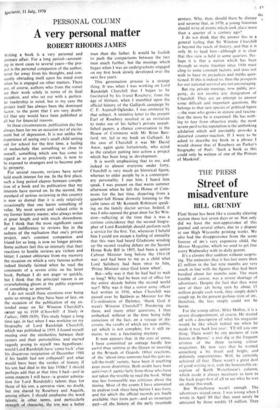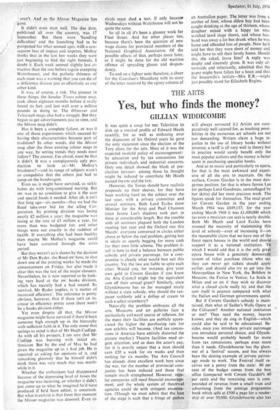THE PRESS
Street of misadventure
BILL GRUNDY
Fleet Street has been like a casualty clearing station these last seven days or so. Not only did we have the non-appearance of this journal and several others, due to a dispute at our High Wycombe printing works. We also had the disappearance from the scene forever of IPC'S very expensive child, the Mirror Magazine, which we used to get free every Wednesday with its daily parent.
It's a closure that saddens without surpris- ing. The estimates that it has lost more than £2 million in the last nine months are very much in line with the figures that had been bandied about for months now. The main trouble of course, was a severe shortage of advertisers. Despite the fact that they were sure of their ads being seen by about 15 million people each week, they simply didn't cough up. In the present parlous state of IPC, therefore, the loss simply could not be borne.
For the young editor, Mike Molloy, it is a severe disappointment, of course. He started off with a description of what his magazine would be like which tickled me when he made it way back last year: 'I'll tell you one thing. There won't be any pictures of rain forests in Burma', a nice dig at the frequent artiness of the three existing colour magazines. He now says that he wanted something a bit brash and bright, and definitely unpretentious. Well, he certainly achieved all that. There wasn't a great deal of good writing in it, with the honourable ex- ception of Keith Waterhouse's column, which made it always necessary to turn to the back pages first of all to see what he was on about this week.
But Waterhouse wasn't enough. The advertisers stayed away. I was wrong when I wrote in April '69 that they must surely be attracted by those weekly 15 million. They eren't. And so the Mirror Magazine has "gone.
It didn't even start well. The due date, publicised all over the country, was 17 September. But there were 'handling difficulties' and the launching had to be postponed for what seemed ages, with a con- sequent loss of impact and impetus. Molloy thinks that in the last few weeks they were just beginning to find the right formula. I doubt it. Each week seemed slightly less at- tractive than the one before (again excepting Waterhouse), and the pathetic thinness of each issue was a warning that you can die of a deficiency disease just as effectively as any other kind.
It was, of course, a risk. The pioneer in these things, the Sunday Times colour mag, took about eighteen months before it really found its feet, and lost well over a million pounds in doing so. The Observer and Telegraph mags also had a struggle. But they began to get advertisements just in time, and the Mirror mag didn't.
Has it been a complete failure, or was it one of those experiments which succeed by having their characteristics become part of tradition? In other words, did the Mirror mag alter the three existing colour mags in any way, by setting trends they needs must follow? The answer, I'm afraid, must be that it didn't. It was a conspicuously ugly pro- duction to look at—Mr Molloy's brashness?—and its range of subjects wasn't so compulsive that the others just had to jump on the bandwagon.
Even so, it might have survived, as sickly babes do with long-continued nursing. But IPC was in no condition to give it the care and special foods it needed. After all, it isn't that long ago—six months—that we had the Reed take-over bid for the ailing Cor-_ poration. Its printing division was losing nearly £2 million a year; the magazine was losing at the rate of £3 million a year, far more than was budgeted for; and other things were not exactly in the ruddiest of health. If everything else had been healthy then maybe Mr Molloy's magazine could have been cossetted through the crisis period.
But they weren't as is shown by the decision of Mr Don Ryder, the Reed-tpc boss, to shut down one of the printing works: he made the announcement on Friday, but also -made it
clear this was the last of the major closures. Nevertheless, he is now reported to be look-
ing very hard at the IPC books division,
which has recently had a bad record. Its survival, Mr Ryder implies, is:a matter of increased efficiency'. The inference is pretty obvious, however, that if there isn't an in- crease in efficiency pretty soon there won't be a books division either.
Yet even despite all that, the Mirror magazine might have survived if there'd been someone high enough up in the hierarchy with sufficient faith in it. The only name that springs to mind is that of Mr Hugh Cudlipp.
As with all his projects, I am sure that Mr Cudlipp was bursting with initial en- thusiasm. But by the end of May he had given the magazine up as a bad job. He is reported as asking for opinions of it, and remarking gloomily that he himself didn't think there was very much that was worth- while in it.
Whether the enthusiasm had disappeared because of the depressing level of losses the magazine was incurring, or whether it didn't just come up to what he imagined he'd have produced if he'd been editor, is uncertain.
But what is certain is that from that moment the Mirror magazine was doomed. Even its rivals must shed a tear, if only because Wednesdays without Waterhouse will not be quite the same.
So all in all it's been a gloomy week for Fleet Street. And for other places too, because there's been the question of new wage claims for provincial members of the National Graphical Association. Of the possible effects of that, perhaps more later, or I might be done for the old wartime offence of spreading gloom and despon- dency.
To end on a lighter note therefore, a cheer for the Guardian's Miscellany with its story of the letter received by the agony column of an Australian paper. The letter was from a mother of four, whose eldest boy had been caught drinking at the age of thirteen, whose daughter mixed with a hippy lot who watched lewd stage shows, and whose hus- band was away a lot but drank when he was home and offended lots of people. Now he'd told her that they were short of money and might have to sell their lovely home. Should she, she asked, leave him? A reply was deeply and sincerely given. It was only af- terwards and reluctantly, admitted that the paper might have fallen for a hoax and that the housewife's initials—Mrs E.R.—might just possibly stand for Elizabeth Regina.































 Previous page
Previous page